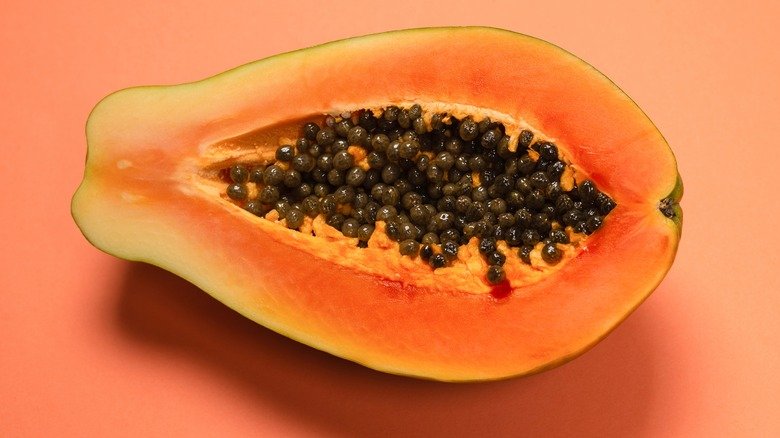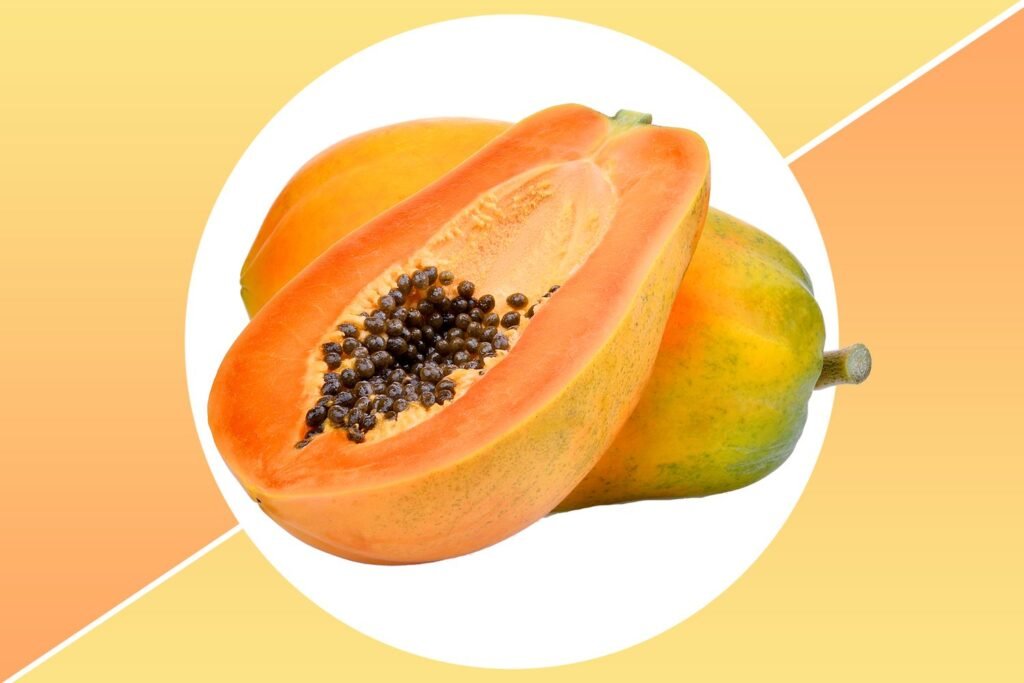
What Is Papaya?
Certainly! Papaya, scientifically known as Carica papaya, is a tropical fruit native to Central America and Southern Mexico. It is now cultivated in various tropical and subtropical regions around the world due to its popularity and nutritional value. Here are some key points about papaya:

Papaya Benefits
Protection against heart disease
Antioxidants like vitamin A, vitamin C, and vitamin E are rich in papayas. Antioxidant-rich diets may lower the risk of heart disease. Antioxidants stop cholesterol from oxidizing. Oxidizing cholesterol increases the risk of heart disease-causing blockages.
In addition, the high fiber content of papayas may lower the risk of heart disease. Diets rich in fiber reduce cholesterol.
Folic acid, which is required to change the amino acid homocysteine into less hazardous amino acids, is one of the other benefits associated with papayas. (Molecular components known as amino acids are part of proteins.) Elevated homocysteine levels, primarily present in meat-based products, are associated with an increased risk of heart disease. Consuming papaya may lessen the risk factor by lowering homocysteine levels.
Digestion And Reduced Inflammation
Papaya helps with digestion by breaking down proteins with the help of enzymes like papain, which improves digestion and reduces bloating. Its high antioxidant content—which includes beta-carotene and vitamin C—neutralizes free radicals to help reduce inflammation and provide relief from inflammatory bowel disease and arthritis, among other diseases. Adding papaya in your diet can help with general inflammation reduction and promote healthy digestion.
Immune System
Consuming vitamin C-rich foods can strengthen your immune system and help your body fend against viral and bacterial infections. This antioxidant is present in papaya in good amounts.
Additionally, papaya is a good source of vitamin A, which is necessary for a strong and robust immune system.
Papaya Seed Benefits

- Digestive Health: Papaya seeds contain enzymes like papain and carpaine, which aid in digestion by breaking down proteins and supporting the digestive process. Consuming papaya seeds can help alleviate digestive issues such as bloating, indigestion, and constipation.
- Antibacterial and Antiviral Properties: Studies have shown that papaya seeds possess antibacterial and antiviral properties, thanks to their rich content of phytochemicals like flavonoids and alkaloids. These properties may help combat bacterial and viral infections in the body.
- Parasite Expulsion: Papaya seeds contain compounds like caricin and carpaine, which have been found to have anthelmintic properties, meaning they can help expel intestinal parasites like worms. Including papaya seeds in your diet may aid in maintaining gut health and preventing parasitic infections.
- Liver Health Support: Some research suggests that papaya seeds may have hepatoprotective properties, meaning they can help protect the liver from damage caused by toxins and oxidative stress. Regular consumption of papaya seeds may contribute to overall liver health and function.
- Anti-inflammatory Effects: Papaya seeds contain antioxidants that possess anti-inflammatory properties, helping to reduce inflammation in the body. This can be beneficial for conditions such as arthritis, asthma, and inflammatory bowel disease.
- Weight Management: Papaya seeds are low in calories but high in fiber, which can promote satiety and aid in weight management by reducing overeating and supporting a healthy metabolism.
- Cardiovascular Health: Some studies suggest that papaya seeds may help lower blood pressure and cholesterol levels, thus promoting cardiovascular health and reducing the risk of heart disease.
Nutrition
A medium-sized papaya contains more than 200% of the vitamin C you need per day. This vitamin helps reduce the risk of heart disease and boosts the immune system. Papayas are also a good source of:
- Vitamin A: Papayas contain beta-carotene, which the body converts into vitamin A. Vitamin A is essential for maintaining healthy vision, skin, and mucous membranes, as well as supporting immune function.
- Fiber: Papayas are a good source of dietary fiber, which is important for digestive health. Fiber aids in digestion, helps regulate bowel movements, and may help lower cholesterol levels and control blood sugar levels.
- Folate (Vitamin B9): Folate is a B vitamin that plays a crucial role in DNA synthesis and cell division. It is especially important for pregnant women, as adequate folate intake is necessary for proper fetal development and can help prevent certain birth defects.
- Potassium: Papayas are a good source of potassium, an essential mineral that helps regulate fluid balance, nerve function, and muscle contractions. Adequate potassium intake may also help lower blood pressure and reduce the risk of stroke and heart disease.
- Vitamin E: Papayas contain vitamin E, a powerful antioxidant that helps protect cells from damage caused by free radicals. Vitamin E also plays a role in immune function and skin health.
- Vitamin K: Papayas provide vitamin K, which is important for blood clotting and bone health. Adequate vitamin K intake may help reduce the risk of osteoporosis and fractures.
- Magnesium: Papayas contain magnesium, an essential mineral that is involved in over 300 biochemical reactions in the body. Magnesium is important for muscle and nerve function, blood sugar control, and bone health.
How to Eat a Papaya
- Choose a Ripe Papaya: Look for a mostly yellow papaya with some green patches and slight softness.
- Wash the Papaya: Rinse it thoroughly under cool water to remove any dirt or debris.
- Cut the Papaya: Slice it in half lengthwise and remove the seeds with a spoon.
- Remove the Skin: Use a spoon to scoop out the flesh from the skin.
- Enjoy Fresh: Eat the ripe papaya flesh as is or add it to fruit salads, smoothies, or yogurt.
- Enhance Flavor (Optional): Sprinkle with lime or lemon juice, salt, or chili powder for added flavor.
- Store Leftovers: Keep any leftover papaya in an airtight container in the refrigerator for a few days.
Papaya Salad
Ingredients:
- 1 small green papaya (peeled, seeds removed, and shredded)
- 2-3 cloves garlic (minced)
- 2-3 Thai bird’s eye chilies (adjust to your spice preference, minced)
- 1 cup cherry tomatoes (halved)
- 1/4 cup roasted peanuts (coarsely chopped)
- 2 tablespoons dried shrimp (optional, for added umami flavor)
- 1-2 tablespoons fish sauce (adjust to taste)
- 1-2 tablespoons palm sugar or brown sugar (adjust to taste)
- Lime wedges (for serving)
Instructions:
- Southeast Asian Delight: Papaya salad, also known as “Som Tam,” hails from Southeast Asia, offering a taste of the region’s vibrant culinary heritage.
- Flavor Explosion: This salad combines shredded green papaya with a mix of fresh vegetables and herbs, creating a symphony of sweet, sour, salty, and spicy flavors.
- Cultural Staple: Papaya salad holds cultural significance in Southeast Asian cuisine, enjoyed as a street food favorite and a cherished part of communal dining experiences.
- Versatile and Customizable: While rooted in tradition, papaya salad allows for endless variations and personal adaptations, making it adaptable to individual tastes and preferences.
- Refreshing and Vibrant: With its colorful presentation and refreshing qualities, papaya salad is a popular choice, particularly during warm weather months.
Papaya smoothie

Ingredients:
- Ripe Papaya: 1 cup, diced
- Banana: 1 medium-sized, ripe
- Greek Yogurt: ½ cup
- Honey or Maple Syrup: 1-2 tablespoons (optional, for sweetness)
- Coconut Water or Almond Milk: ½ cup
- Ice Cubes: ½ cup (optional, for a chilled smoothie)
- Lime Juice: 1 tablespoon (optional, for a hint of tanginess)
Instructions:
- Tropical Treat: A papaya smoothie is a delightful beverage that captures the exotic flavors of ripe papaya, offering a taste of the tropics with every sip.
- Nutrient-Rich Blend: This smoothie combines the goodness of papaya with other nutritious ingredients, providing a boost of vitamins, minerals, and antioxidants in every serving.
- Refreshing and Energizing: Whether enjoyed as a breakfast option, a midday snack, or a post-workout refresher, a papaya smoothie is both refreshing and energizing, providing a natural burst of vitality.
- Versatile and Customizable: While papaya takes center stage, you can customize your smoothie by adding complementary fruits, such as banana or mango, and your choice of liquid base, such as coconut water or almond milk.
- Quick and Easy to Prepare: With just a few ingredients and a blender, you can whip up a delicious papaya smoothie in minutes, making it a convenient option for busy lifestyles.


